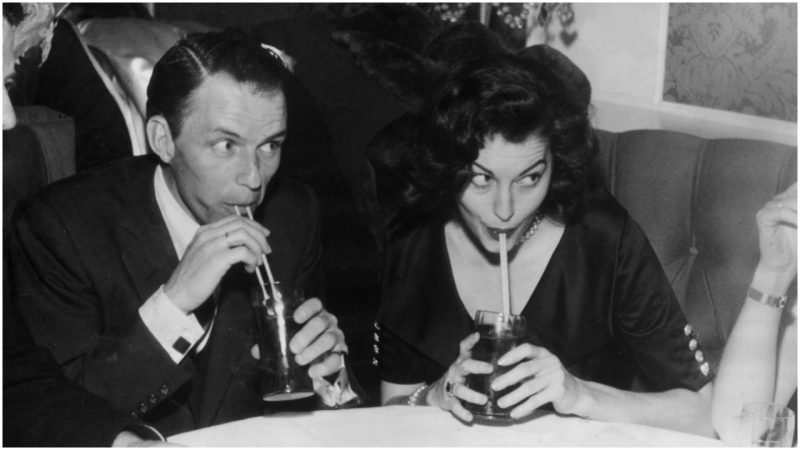Some Hollywood romances lead to a wedding. Such unions might not last, but in certain marriages, the love never dies. Such was the case with Frank Sinatra and Ava Gardner.
When Sinatra, already a famous crooner, first spotted the gorgeous Gardner, it was in a magazine photograph. He declared to a friend, “I’m gonna marry that girl one day.” One obstacle: Frank was married to his first wife, Nancy Sinatra, the mother of his three children.
When Sinatra found himself in Gardner’s presence, at a friend’s party, he was completely infatuated. She wasn’t. Gardner had already met him at MGM studios and wasn’t impressed, considering him “too arrogant, overpowering and conceited.” During that time, Gardner was unhappily married to Artie Shaw, who she said was “an aggressive eradicator of her self-esteem.”
Sinatra’s and Gardner’s paths crossed again on February 10, 1949, when Gardner, who was headed for MGM’s silver anniversary party in her green Cadillac, drove past Sinatra. When she pulled alongside, a grinning Frank raised his hat, catching Gardner’s attention. She later recalled: “He was so handsome, with his thin, boyish face, bright blue eyes and incredible grin. And he was so enthusiastic and invigorated, clearly pleased with life, in general, himself, in particular, and, at that moment, me.”
Soon after, he asked her out, and this time she didn’t think twice. They went for a late-night drunken drive from Palm Springs to Indio and shot out streetlights and store windows with .38 pistols as they went by.
That first date set the tone for their relationship, one of intense passion, quarrels, and alcohol. Sinatra was sure it was love and so he wasted no time announcing to Nancy that he was leaving her and their family for another woman. The divorce papers were quickly signed, and in 1951, the church bells rang for Gardner and Sinatra.
Their marriage was followed closely by the American press, which didn’t hold back in its criticism, labeling the whole affair as a “scandalous infidelity.”At the time Frank was 35 and Ava was 28.
They were clearly mad about each other but were unable to find much peace together. Their fiery liaison was wracked by feelings of insane jealousy each carried, whether it was over a co-star or an over-infatuated fan. They were both quick-tempered and couldn’t control it, even in public. According to one of their friends, “being with them was like sitting on cracked eggs. You never knew if there were going to be verbal daggers.”
Moreover, both of them were attention seekers with a large appetite for stardom, booze, and excitement. And both were guilty of an infidelity here and there. The fights grew more vicious. Their marriage imploded and in 1953, the pair divorced. Sinatra reportedly blamed actor Peter Lawford for the split and was inconsolable. On November 18 of that year, Sinatra was found in the elevator of his 5th Street apartment with his wrists slashed. He spent two days in hospital, saying that there had been an accident with broken glass.
They managed to get along with each other after the divorce, but Sinatra never got over Ava, and as his daughter Tina Sinatra stated in an interview: “Dad and Ava moved permanently from turbulent romance to entitled friendship, and no one replaced her.”
Gardner carried on with her life, getting involved in new relationships but never remarrying, claiming that “Francis and I became lovers forever, eternally. Big words, I know, but I truly felt that no matter what happened we would always be in love.”
Sinatra married Mia Farrow, divorcing her after two years, and then wed fourth wife Barbara in 1976.
But for Gardner’s birthday each year, Sinatra sent her an extravagant bouquet of flowers. Gardner would put them in a vase in her bedroom and keep it there, long after the blooms had faded.
